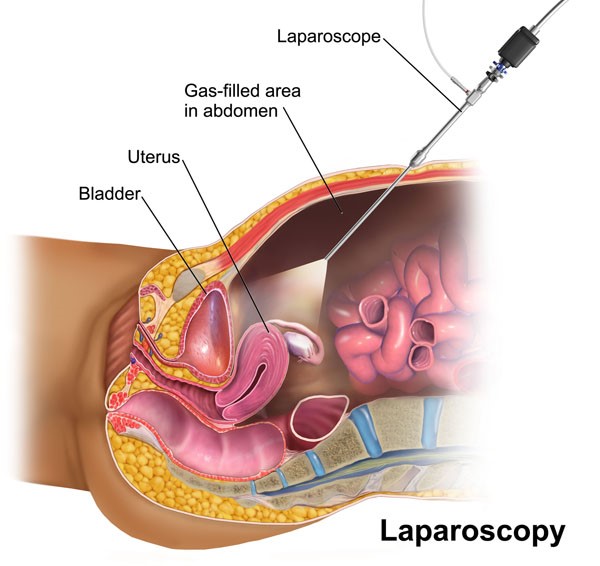DEPARTMENT OF GYNECOLOGY
The medical specialists of the department of gynecology carry out all types of surgeries. Most of the surgeries are laparoscopic ones. We offer endoscopic diagnostics, treatment and rehabilitation. Highly-qualified medical specialists perform reconstructive surgeries on the uterus and uterine appendages (in patients with uterine fibroids), surgeries for endometriosis, adhesions, pelvic organ prolapse.
We perform:
Plastic surgeries:
- surgery
- perineoplasty;
- surgery for pelvic organ prolapse;
- reconstructive surgery with the help of allografts.
Plastic organ preservation surgeries:
- on the uterine;
- on the fallopian tubes and ovaries.
Endoscopic surgeries:
- all types of laparoscopic surgeries;
- hysteroresectoscopic surgeries (myomectomy, polypectomy, endometrial ablation);
- hysteroscopy.
If necessary, we use laser, ultrasonic dissector.
Termination of pregnancy:
- Termination of pregnancy until week 12 at the request of a patient.
 Laparoscopy is a modern surgery technique widely used in gynecology. It is an aid in the the diagnosis and treatment of diseases. It is a minimally invasive and less traumatic technique compared to major surgery, which ensures a shorter recovery time and helps to avoid major scars.
Laparoscopy is a modern surgery technique widely used in gynecology. It is an aid in the the diagnosis and treatment of diseases. It is a minimally invasive and less traumatic technique compared to major surgery, which ensures a shorter recovery time and helps to avoid major scars.
 There are special requirements for laparoscopy:
There are special requirements for laparoscopy:
- special medical equipment;
- specially equipped surgery unit;
- highly qualified medical specialist who took a special training.
We meet all the above requirements.
Indications
- infertility;
- tumors and tumor-like lesions of ovaries;
- endometriosis;
- chronic pelvic pain;
- uterine fibroids;
- ectopic pregnancy;
- tubal ligation, sterilization, etc.
Contraindication
- some cardiovascular diseases;
- pulmonary diseases;
- blood-clotting disorders;
- severe obesity;
- hiatal hernia, midline hernia, abdominal wall hernia, etc.
Additional contraindication: recent acute respiratory infection, herpes labialis, changes in a complete blood count or urinalysis. In this case, you will be advised to undergo additional examinations, treatment or rehabilitation. After that you may undergo laparoscopy.
How to prepare for a planned laparoscopy?
- Blood tests:
- complete blood count
- HIV, hepatitis B and C (for indications), syphilis
- blood chemistry
- coagulation profile
- glucose test
- Rh and blood group test
- urinalysis
- swabs for STDs and bacteria, and pap test
- endometrial biopsy (scraping)
- ECG
- pelvic ultrasound
- tumor marker test
- examination by a general practitioner and gynecologist (+ by a surgeon, if necessary)
- colposcopy
- fluorography
- EGD and colonoscopy
Having the results of the above tests and a referral from a women’s health clinic, a patient is admitted to the department of gynecology. The council of physicians informs her about the extent of surgery, possible outcome and complications. Then the patient is examined by an anesthesiologist for allergy to anesthetic agents. The anesthesiologist also asks the patient about past diseases and surgery (if any) and decides on aestheticization.

























Chief of the Department
Rubinshtein Iryna
Reception hours: